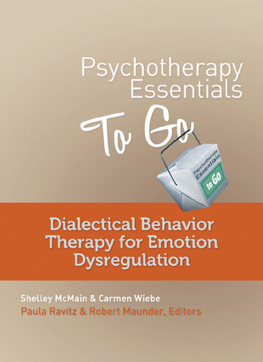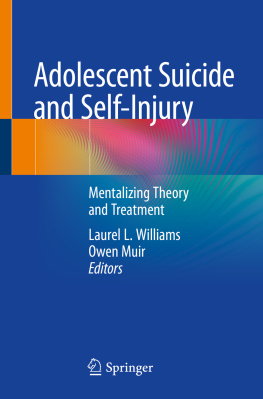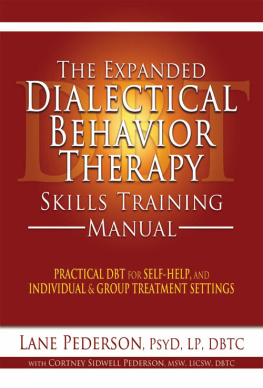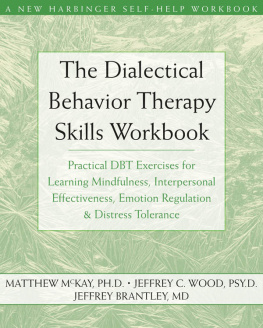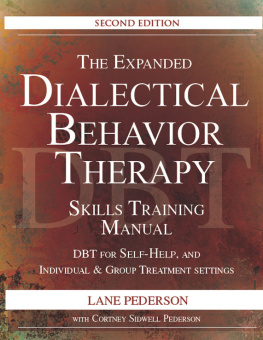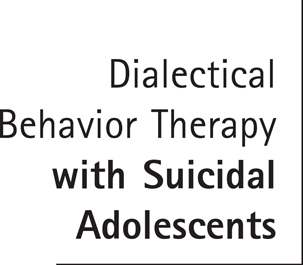
ALEC L. MILLER
JILL H. RATHUS
MARSHA M. LINEHAN
Foreword by Charles R. Swenson

T HE G UILFORD P RESS
New York/London
2007 The Guilford Press
A Division of Guilford Publications, Inc.
370 Seventh Avenue, Suite 1200, New York, NY 10001
www.guilford.com
Paperback edition 2017
All rights reserved
2007 Epub Edition ISBN: 9781606237892
Except as noted, no part of this book may be reproduced, translated, stored in a retrieval system, or transmitted, in any form or by any means, electronic, mechanical, photocopying, microfilming, recording, or otherwise, without written permission from the Publisher.
Last digit is print number: 9
LIMITED DUPLICATION LICENSE
These materials are intended for use only by qualified mental health professionals.
The publisher grants to individual purchasers of this book nonassignable permission to reproduce all materials for which permission is specifically granted in a footnote. This license is limited to you, the individual purchaser, for personal use or use with individual clients and patients. This license does not grant the right to reproduce these materials for resale, redistribution, electronic display, or any other purposes (including but not limited to books, pamphlets, articles, video- or audiotapes, blogs, file-sharing sites, Internet or intranet sites, and handouts or slides for lectures, workshops, webinars, or therapy groups, whether or not a fee is charged). Permission to reproduce these materials for these and any other purposes must be obtained in writing from the Permissions Department of Guilford Publications.
Library of Congress Cataloging-in-Publication Data
Miller, Alec L.
Dialectical behavior therapy with suicidal adolescents / by Alec L.
Miller, Jill H. Rathus, & Marsha M. Linehan.
p.; cm.
Includes bibliographical references and index.
ISBN-13: 978-1-59385-383-9 (hardcover, alk. paper)
ISBN-13: 978-1-4625-3205-6 (paperback, alk. paper)
1. Dialectical behavior therapy. 2. TeenagersSuicidal
behavior. 3. TeenagersMental health. 4. Self-destructive
behavior. I. Rathus, Jill H. II. Linehan, Marsha. III. Title.
[DNLM: 1. Adolescent. 2. Suicideprevention &
control. 3. Adolescent Psychology. 4. Behavior Therapy
methods. 5. Self-Injurious Behaviortherapy. WS 463 M6468d 2006]
RC569.5.S45M552 2006
616.89142dc22 2006022291
We dedicate this book to our clients and their families. They have taught us about resilience, compassion, perseverance, and courage. Their lives, and their work with us to develop a version of dialectical behavior therapy that is effective for them, have served as the inspiration for our book
A LEC L. M ILLER , P SY D, is Co-Founder and Clinical Director of Cognitive and BehavioralConsultants, White Plains and New York, New York, and Clinical Professor of Psychiatryand Behavioral Sciences at Montefiore Medical Center/Albert Einstein College of Medicine,Bronx, New York. Dr. Miller served for over 20 years as Professor of Clinical Psychiatry andBehavioral Sciences, Chief of Child and Adolescent Psychology, Director of the AdolescentDepression and Suicide Program, and Associate Director of Psychology Training atMontefiore Medical Center. He is a scientific advisor to the American Foundation of SuicidePrevention and the National Educational Alliance of Borderline Personality Disorder, a Fellowof the American Psychological Association, and past Chair of the International Society forthe Improvement and Training of Dialectical Behavior Therapy. He has published numerouspeer-reviewed journal articles, book chapters, and books on topics including dialectical behaviortherapy (DBT), adolescent suicide, childhood maltreatment, and borderline personalitydisorder. He has conducted over 400 lectures and workshops around the world, trainingthousands of mental health professionals in DBT. He is the co-author of DBT Skills inSchools and DBT Skills Manual for Adolescents.
J ILL H. R ATHUS , P H D, is Professor of Psychology at Long Island University Post, whereshe directs the DBT scientist-practitioner training program within the clinical psychologydoctoral program. She is also Co-Director and Co-Founder of Cognitive Behavioral Associates,a group private practice in Great Neck, New York, specializing in DBT and cognitivebehavioraltherapy (CBT). Her clinical and research interests include DBT, CBT, adolescentsuicidality, intimate partner violence, anxiety disorders, and assessment. She has developedand conducted programs in DBT for adolescents and adults as well as males referred for intimatepartner violence, and has received foundation and university funding to study, adapt,and develop assessment tools for DBT. She has published numerous peer-reviewed articlesand chapters on DBT, adolescent suicide, couple therapy, intimate partner violence, personalitydisorders, assessment, and anxiety disorders. She is the co-author of DBT Skills inSchools, DBT Skills Manual for Adolescents, Marital Distress: Cognitive Behavioral Interventionsfor Couples, Assessment of Family Violence, and Assessment of Partner Violence.
M ARSHA M. L INEHAN , P H D, ABPP, the developer of DBT, is Professor of Psychologyand of Psychiatry and Behavioral Sciences and Director of the Behavioral Research and TherapyClinics at the University of Washington. Her primary research interest is in the developmentand evaluation of evidence-based treatments for populations with high suicide risk andmultiple, severe mental disorders. Dr. Linehans contributions to suicide research and clinical psychology research have been recognized with numerous awards, including the 2017 Universityof Louisville Grawemeyer Award for Psychology and the 2016 Career/LifetimeAchievement Award from the Association for Cognitive and Behavioral Therapies. She is alsoa recipient of the Gold Medal Award for Life Achievement in the Application of Psychologyfrom the American Psychological Foundation and the James McKeen Cattell Award from theAssociation for Psychological Science. In her honor, the American Association of Suicidologycreated the Marsha Linehan Award for Outstanding Research in the Treatment of SuicidalBehavior. She is a Zen master and teaches mindfulness and contemplative practices via workshopsand retreats for health care providers.
Alec Miller is a jazz pianist. A jazz musician holds tight to his fundamentals and improvises within the rules. Thats exactly what it takes to adapt an evidence-based treatment to a new population.
Jill Rathus is a mother of twins. A parent of twins seeks balance and searches for truth in opposing perspectives. Thats just what it takes to work dialectically with multiproblem, suicidal teens and their families.
Dialectical behavior therapy (DBT) evolved from Marsha Linehans own application of standard cognitive-behavioral therapy (CBT) to individuals with suicidal and self-injurious behaviors. It did not work. The patients, typically of a highly sensitive and emotionally reactive nature, and having endured years feeling misunderstood and judged by those around them, felt corrected and invalidated by the direct focus on behavioral change. Weekly crises trumped problem-solving procedures. But guided by a steady focus on behavioral outcomes, Linehan stayed the course, improvising within the rules. She modified her use of CBT strategies to fit the individuals and the moment. She eliminated strategies that didnt seem to work. She experimented with interventions from other individual and family psychotherapy models, self-help programs, and spiritual practices, preserving those that met with success. Developed first from a straight, then slightly modified, behavioral model, DBT arrived on the scene as a synthesis of three paradigms:
Next page


